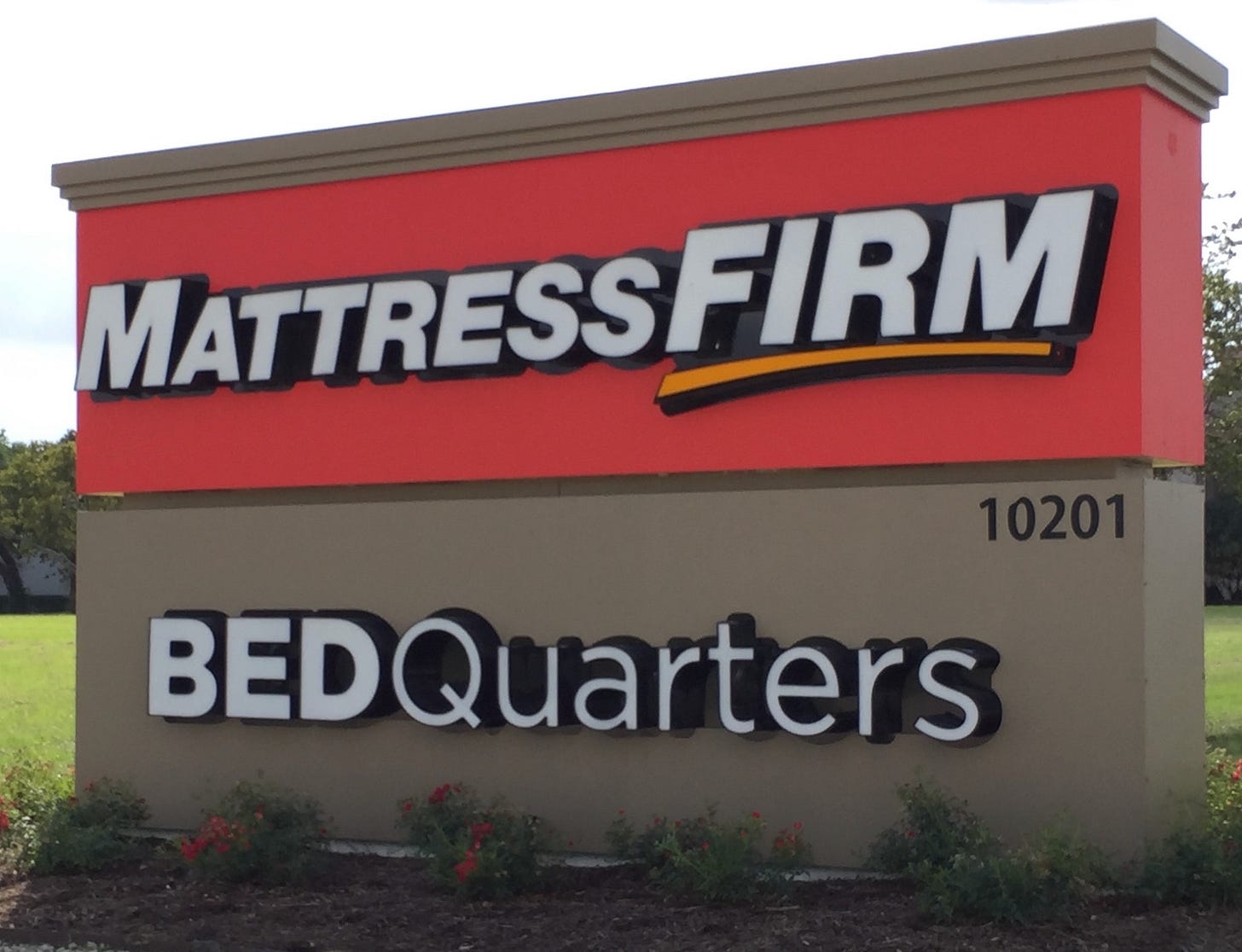“There is no foolproof protection against a CEO who is a crook.” – Christo Wiese
The “energy capital of the world” had more mattress stores than leaky oil tanks – or so it seemed when I moved to Houston in 2016.
Mattress Firm had outlets stationed within blocks of each other. How could the company afford the leases on all this pricey retail space? How many mattresses did this sleepless oil town need?
Houston, I soon learned, was what the padding peddler called its “Bedquarters,” and its mattresses were not stuffed with cash. The company was bursting with debt from a mad buyout spree, rolling up Sleepy’s, Sleep America, Mattress Barn and other competitors nationwide.
Ever wonder why mattresses are so expensive? You can rest assured that debt-driven buyouts figure into your good night’s sleep. The industry has been tangled in high-finance game of “flip this mattress” for decades. (See my 2012 column in The Wall Street Journal.)
At its peak, Mattress Firm grew to more than 3,500 stores nationwide. In 2016, I was quick to put it on my list of emerging corporate blunders, but company officials told me their ubiquitous stores were inexpensive to operate and that their signage served as effective advertising.
A bigger blunderer comes to Houston
Before the year was through, Mattress Firm grabbed a lifeline from a much larger debt-bloated company called Steinhoff International. This South African furniture conglomerate is organized under a Dutch holding company with stock that trades in both Frankfurt, Germany, and Johannesburg, South Africa. (Yeah, mattresses are complicated. Better go to business school if you’re gonna flip them.)
Steinhoff, a.k.a. “Africa’s IKEA,” offered $3.8 billion to acquire Mattress Firm and its billowing pile of debt. The 2016 deal represented a flabbergasting 115% premium over Mattress Firm’s stock price. Steinhoff officials said they needed Mattress Firm’s mammoth retail footprint as a fast track into the U.S. market. But it was clearly a misstep.
Within a year, Steinhoff’s CEO Marcus Jooste resigned amid alleged accounting irregularities. The company’s stock collapsed, losing 90% of its value. The scandal swiftly wiped out investors, sacked pension funds, and burnished Steinhoff’s legacy as the South African Enron.
“I made some big mistakes and have now caused financial loss to many innocent people,” Jooste confessed in a 2017 email to Steinhoff staff.
In 2018, Steinhoff rolled Mattress Firm into bankruptcy court, tacitly admitting it had too much debt, too many online competitors and too many stores that cannibalized each other.
Rest in peace
Last week, Jooste shot himself in the head.
Jooste, 63, once known as one of South Africa’s richest and most successful businessmen, reportedly pulled the trigger on the rocks near his home in the wealthy coastal town of Hermanus on March 21. A day earlier, South African regulators fined him $25 million, calling him the mastermind behind Steinhoff’s fraud. He also faced criminal fraud and racketeering charges.
Among a slew of accounting tricks, Steinhoff allegedly used its unrelenting buyout spree to hide debt and overstate earnings. Merger accounting is often like not counting at all, and merger-manic Mattress Firm was just one of Steinhoff’s many slippery deals.
There’s more to the story, but the rest is for paid subscribers.Please help make the business world a more honest, less reckless, less authoritarian place by:
Liking and commenting on posts, which boosts the Substack algorithm.
Sharing this newsletter with friends and associates.
Subscribing. Free or paid, I’m so glad you’re here.
And don’t miss these blunders.
Keep reading with a 7-day free trial
Subscribe to Business Blunders to keep reading this post and get 7 days of free access to the full post archives.




